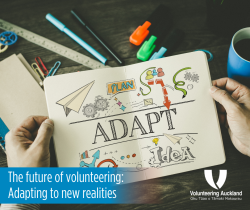The Future of Volunteering: Adapting to New Realities

Volunteering has long been a vital force in communities worldwide, contributing to social cohesion, offering critical support services, and driving positive change. As society evolves, so too does the landscape of volunteering.
The future of volunteering is being shaped by technological advancements, shifting demographics, changing societal expectations, and emerging global challenges. To remain relevant and impactful, the volunteer sector must adapt to these new realities.
This article explores the key trends and opportunities that will define the future of volunteering.
1. Technological Advancements and Digital Volunteering
Technology is rapidly transforming how we live and work, and volunteering is no exception. The rise of digital tools and platforms has made volunteering more accessible and flexible, enabling individuals to contribute their time and skills from anywhere in the world. Virtual volunteering, where tasks are completed online rather than in person, has gained traction, especially during the COVID-19 pandemic, which necessitated social distancing and remote engagement.
The future of volunteering will see a further integration of technology, with more organisations adopting digital platforms to manage volunteer activities, communicate with volunteers, and deliver services. Online platforms can match volunteers with opportunities based on their skills, interests, and availability, making it easier for people to find roles that suit them. Additionally, digital tools can enhance the training and development of volunteers, providing online courses, webinars, and resources to equip them with the skills they need.
Moreover, technology will enable new forms of volunteering, such as micro-volunteering, where individuals can contribute in short, flexible bursts of activity that fit around their schedules. This approach appeals to people who want to make a difference but cannot commit to regular, long-term volunteer roles. By embracing digital solutions, the volunteer sector can reach a wider audience, engage more people, and offer diverse and meaningful opportunities.
2. Embracing Diversity and Inclusion
The future of volunteering will be shaped by a commitment to diversity and inclusion. As societies become more diverse, volunteer-involving organisations must reflect the communities they serve. This means actively engaging volunteers from all backgrounds, including different ethnicities, ages, genders, abilities, and socio-economic statuses.
To attract a diverse range of volunteers, organisations need to adopt inclusive practices that ensure everyone feels welcome and valued. This involves creating volunteer opportunities that are accessible to people with disabilities, offering flexible roles that accommodate different lifestyles, and providing culturally sensitive training and support. By fostering an inclusive environment, organisations can tap into a broader pool of talent, ideas, and perspectives, enriching their work and enhancing their impact.
Inclusion also means recognising and valuing the contributions of all volunteers, regardless of their background. Volunteer-involving organisations must ensure that their leadership, decision-making processes, and recognition programmes reflect the diversity of their volunteers. By doing so, they can create a sense of belonging and ownership among volunteers, leading to greater engagement and satisfaction.
3. Responding to Changing Volunteer Motivations
The motivations of volunteers are changing, driven by generational shifts and evolving societal values. Today's volunteers are increasingly seeking opportunities that align with their personal values, interests, and desire for meaningful impact. They want to know that their contributions are making a difference and are often motivated by issues such as social justice, environmental sustainability, and community well-being.
To attract and retain volunteers, organisations need to understand and respond to these motivations. This means offering roles that are purpose-driven, aligned with social causes, and provide a sense of fulfillment. Organisations should also provide opportunities for skill development, personal growth, and leadership, as many volunteers are looking to enhance their skills and gain experience that can benefit their careers or personal lives.
In addition, the future of volunteering will see a rise in skills-based volunteering, where individuals use their professional expertise to support organisations. This trend reflects a growing desire among volunteers to leverage their skills to make a meaningful impact. Organisations can benefit from this by offering roles that require specific skills, such as marketing, IT, finance, or legal expertise, and by providing opportunities for volunteers to contribute to strategic projects and initiatives.
4. Building Resilience and Sustainability
The future of volunteering will be shaped by the need for resilience and sustainability. The COVID-19 pandemic highlighted the importance of adaptable and resilient volunteer programmes that can respond to crises and changing circumstances. Organisations must be prepared to manage disruptions, whether due to natural disasters, economic downturns, or health emergencies, and ensure that their volunteer programmes can continue to operate effectively.
Building resilience involves investing in the training and development of volunteer leaders, ensuring that they have the skills and knowledge to manage volunteer programmes effectively. It also means developing robust systems and processes for volunteer management, including risk management, health and safety, and data protection.
Sustainability is also a key consideration for the future of volunteering. As concerns about climate change and environmental sustainability grow, volunteer-involving organisations must consider their environmental impact and adopt sustainable practices. This may involve reducing the carbon footprint of volunteer activities, promoting environmentally friendly initiatives, and engaging volunteers in sustainability projects.
5. Leveraging Partnerships and Collaboration
The future of volunteering will be characterised by greater collaboration and partnership. Organisations will increasingly work together to address complex social issues, leveraging their collective resources, expertise, and networks. By forming partnerships with other non-profits, businesses, government agencies, and community groups, volunteer-involving organisations can achieve greater impact and scale.
Collaborative approaches can also enhance the volunteer experience by providing opportunities for volunteers to engage in cross-sector initiatives and learn from different perspectives. Partnerships can open up new avenues for funding, training, and capacity building, strengthening the volunteer sector as a whole.
Conclusion: Embracing the Future of Volunteering
The future of volunteering is full of opportunities and challenges. By embracing technology, fostering diversity and inclusion, responding to changing motivations, building resilience and sustainability, and leveraging partnerships, the volunteer sector can continue to thrive and make a meaningful impact. As society evolves, so too must the volunteer sector, adapting to new realities and finding innovative ways to engage and inspire people to contribute their time, skills, and passion to the greater good. In doing so, volunteering will remain a powerful force for positive change, enriching lives and strengthening communities around the world.

